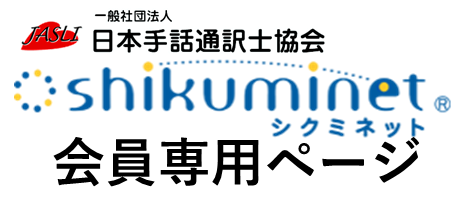Japanese Association of Sign Language Interpreters
1. Address by the JASLI Chairperson, Yumi Suzuki
2. A Brief History of the General Incorporated Association of the Japanese Association of Sign Language Interpreters (JASLI)
3. Activities
4. A Brief Job Description of Sign Language Interpreting
5. The Ethical Guidelines of Japanese Sign Language Interpreters
6. Upon Being Qualified as a Public Corporation
7. The Situation of Sign Language Interpretation in JAPAN(2014)
8. A Study Guide on the Code of Ethics for Certified Sign Language Interpreters(2019)
1. Address by the JASLI Chairperson, Yumi Suzuki
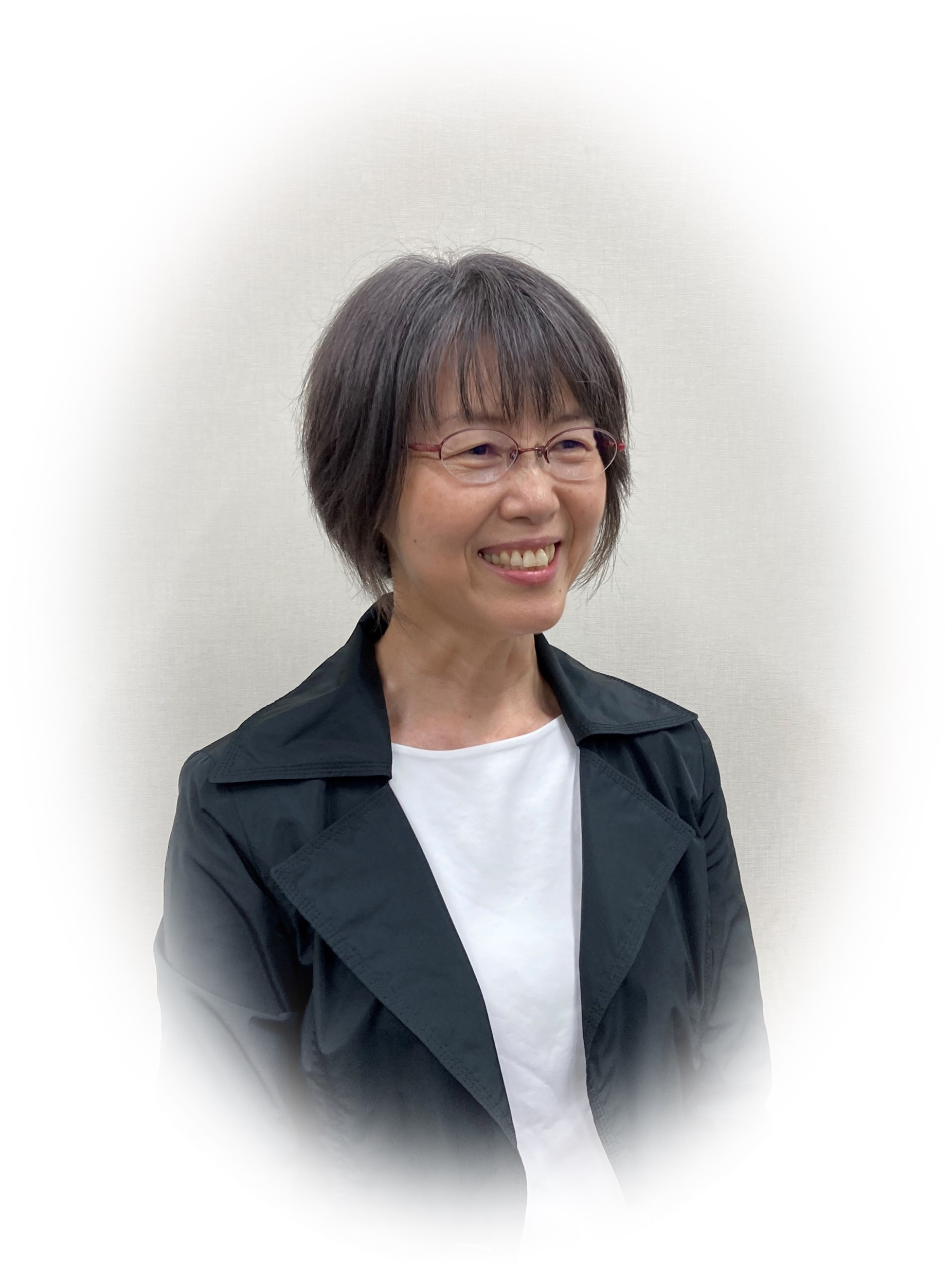
Hello, my name is Yumi Suzuki, a newly appointed JASLI president.
I thank you for giving me the opportunity to greet you at the WASLI Asia meeting.
My message is translated into International Signs by a Deaf interpreter.
JASLI was established in 1991 and currently has 2,384 members.
Since its inception until today,
JASLI has engaged actively and succeeded in creating Code of Ethics for Certified Sign Language Interpreters and appointing sign language interpreters at election broadcasts as well as press conferences by the government and Meteorological Agency.
We are currently discussing about the national certification of sign language interpreters and the mandatory of hiring them at local governments.
Under the pandemic of COVID-19, sign language interpreters have hard time at their assignments. Also, they cannot gather for discussion or trainings.
We need to keep striving to our goals, therefore, we must find the ways to operate our association in this New Normal.
On June 20, 2021, at the JASLI general assembly,
Ms. Eiko Ogura resigned from presidency and Mr. Norio Kawane from board members, who have been the leaders of sign language interpreters and JASLI members.
Ms. Ogura served as a board member since 1993 and as president for 17 years since 2003.
Mr. Kawane became a board member in 1993 and served as a general secretary since 2019.
They have embodied what is written in the preface of Code of Ethics for Sign Language Interpreters, "interpreters will collaborate with each other and with all people in society to attain deaf people's equal opportunity and full participation in society. "
Both of them have good judgements and ability to take action in various circumstances. They are good listeners and mentors.
They provided good discussions when needed, and put the association together. With all the strength, they led the association and the members.
Their resignment made me nervous because I am far behind their skills.
However, when they told me I could do it,
I felt their bravery and generosity, and had enormous respect for them.
I thought that bravery comes from the trust in people and the association.
I'd like to have the same "bravery" "generosity" and "trust".
The environment surrounding persons with disabilities had significant changes.
Today, the rights of PWDs are more respected and they can participate more in the society.
Sign language interpretation field became wider than ever, and naturally, the expectation for those interpreters' level of expertise grew higher.
However, the aging of interpreters is a big challenge in Japan.
According to the fact-finding survey on sign language interpreters in 2019, almost 80% of them are over 50 years old.
Another survey on the labor and the health condition of sign language interpreters in 2020 shows the average of their age was 54.4 years old.
80% of the interpreters who answered the survey are not hired as full-time employees.
Many of them earn low salary and worry about their lives.
We, sign language interpreters, work for social participation and independence of the Deaf, and find our work rewarding.
However, our job is still unstable and underestimated as the society has not yet recognized the role and expertise of sign language interpreters.
This is very sad and frustrating fact.
Under the new leadership, we will work together with our members and collaborate with many others to realize the national certification of sign language interpreters and the mandatory of hiring them at local governments.
We keep striving for enhancement of sign language interpretation system by reflecting and studying our daily practice, and improving our expertise, so that the society recognizes us fairly and we will be able to work healthy with pride and a sense of assurance.
2. A Brief History of the General Incorporated Association
of the Japanese Association of Sign Language Interpreters (JASLI)
The Japanese Association of Sign Language Interpreters (JASLI) was established in 1991 by sign language interpreters (SLIs) all over Japan aiming to improve the quality and the professional skills of SLIs and to contribute to the development of sign language interpretation services and systems in Japan.
As a professional organization, JASLI has held annual conferences to share the experiences and skills of SLIs since 2003, publishing its proceedings.
JASLI created the Ethical Guidelines of Japanese Sign Language Interpreters in May 1997, acknowledging its importance to serve as a basic guideline for professional SLIs, whose work deals with the issues of life, property and human rights, to establish credibility and to work without influences from any social circumstance discrimination-free. It was also expected that, with this Ethical Guidelines of SLI, JASLI could raise its profile and gain recognition as a professional organization.
As the Ethical Guidelines of SLI defines the standards of conduct in all sign language interpreting settings, every SLI with or without certification is expected to adhere to its standard. In order to raise awareness about the Ethical Guidelines of SLI among relevant parties, JASLI published and distributes a booklet called "Ethical Guidelines of Sign Language Interpreters for Everyone".
3. Activities
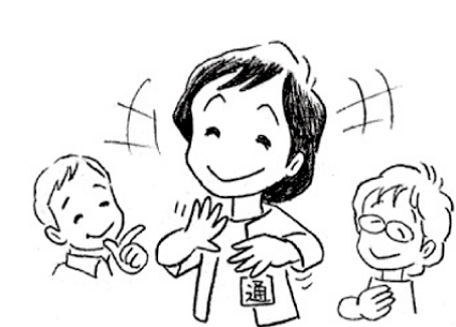
The Sign Language Interpreter Certificate Examination (SLICE) has been administered since 1989. This contributes to the career paths of many qualified professional SL interpreters who are now playing important roles throughout the country.
JASLI provides following services:
1) In-service training for SL interpreters
2)Supervised study and research for the achievement of unmistakable professionalism among SL interpreters
3) Appropriate information about sign language interpretation
4) Support and instruction for prospective SL interpreters
5)Counseling, suggestions and addressing inquiries concerning sign language interpretation
6) The deployment of various efforts to improve societal perception of SL interpreters
7) The publication of " TUBASA(Wings)" −the JASLI Newsletter.
4.A Brief Job Description of Sign Language Interpreting
Sign language interpreters need to possess a broad spectrum of social skills, have an understanding of a wide variety of subjects, besides, of course being adept at interpretation because their role is to help people who have difficulties in communicating with the hearing community.
During the actual situation of interpreting, an interpreter has the important task of being the only person who knows the opinion or ideas of both sides of the conversation.
The Sign Language Interpreter Certificate Examination (SLICE) aims to ascertain that the applicant has sufficient technical skill and knowledge to be certified as a professional sign language interpreter.
With the change of election law, since1995, in order to show their political views, the poll-booked party candidates for the Upper House have become eligible to employ interpreters who have been certified by the Ministry of Health, Labor and Welfare. At long last, the professional recognition of sign language interpreters became incorporated into the Law.
However, besides this statement as law, we cannot find any further reference to the lawful application of sign language interpreting on a national level. This is because sign language interpreting has yet to be designated as requiring occupational licensing.
Recently, the trend has been that when a certain governmental agency requires an SLI, they seem to hire one from the list of certificated interpreters who passed the SLICE.
Nationwide, not only certified interpreters, but also interpreters for the Deaf acting privately and enthusiastic sign learners support and improve the lives of the Deaf.
Most of them work part time without any compensation and without any legal back up and therefore have no professional job status.
5.Code of Ethics for Certified Sign Language InterpretersJapanese Association of Sign Language Interpreters (JASLI)
As Certified Sign Language Interpreters, we endeavor to eliminate the barriers standing in the way of the social participation of deaf people, and to realize their full participation and equality in society. This will lead to the self-fulfillment of all members of the society.
Based on this understanding, we interpreters, as professionals who should be valued appropriately in society, will collaborate with each other and with all people in society. We therefore hereby establish this Code of Ethics.
1. Interpreters respect and advocate the fundamental human rights of all persons.
2. Interpreters make sincere efforts to enable deaf people to participate independently in all social activities and situations by fully applying their professional skills and knowledge.
3. Interpreters endeavor to improve and enhance their service by encouraging persons in charge at their workplaces or agencies to understand and observe the Code of Ethics in order to establish favorable working conditions.
4. Interpreters shall not disclose information about any participant learned in the course of duties, to any third party without permission.
5. Interpreters continually strive to improve their professional skills and knowledge.
6. Interpreters are responsible for the verification that their skills and knowledge are not used for violations of human rights, nor for any anti-social purpose.
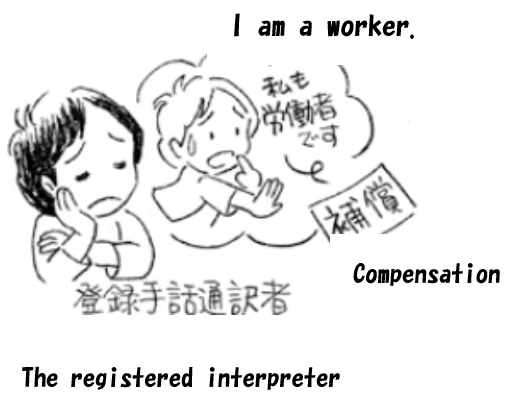 7. Interpreters actively engage in research and practices which enhance the development of the sign language interpretation system and interpreter training.
7. Interpreters actively engage in research and practices which enhance the development of the sign language interpretation system and interpreter training.
Effective May 4th, 1997
6. Upon Being Qualified as a Public Corporation
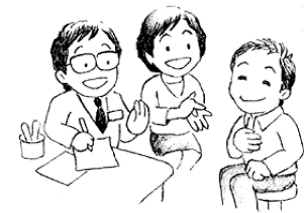
The Japanese Association of Sign Language Interpreters was established for the purpose of improving the quality and professional skills of sign language interpreters(SLI) three years after the first examination for SLI in1989. We have been doing various activities to improve the status of SLI and with the aim of being evaluated as a professional organization for about 20 years. "The Ethical Guidelines of SLI" was established to insure the proper social evaluation of our group. Meanwhile, the number of SLIs has been certainly increasing in spite of many difficulties. SLIs are introduced in the Upper House elections and also in the party political broadcasts for the Lower House in Japan. Due to the wide spread socially recognized importance of including the Deaf in societal participation, Japanese local governments are starting to enlist the services of SLIs. Now their social status has been gradually raising and they are being recognized as playing socially-important roles to realize the participation of the Deaf in society.
Achieving the converting of our association into independent corporate entities is no call for us to rest. There are still many problems that must be resolved for SLI to be socially recognized. In order for the license of SLI to be considered as a professional qualification, the title needs to be enshrined into law. For the realization of this aim, we ― the Japanese Association of the SLI ― have to promote the social recognition of the SLI title and lay down our roots as a necessary professional organization in society more than ever.
We are convinced that this approach of pursuing social recognition further enables us to contribute to the social well-being of the Deaf. We still face a number of challenges, like the social recognition of SLI certification as mentioned above and also the agendas between jobs and license. We heartily appreciate your understanding and support. We would like to make progress with the help of all for the future of society. Thank you.
June, 2009
7.The Situation of Sign Language Interpretation in JAPAN(2014)
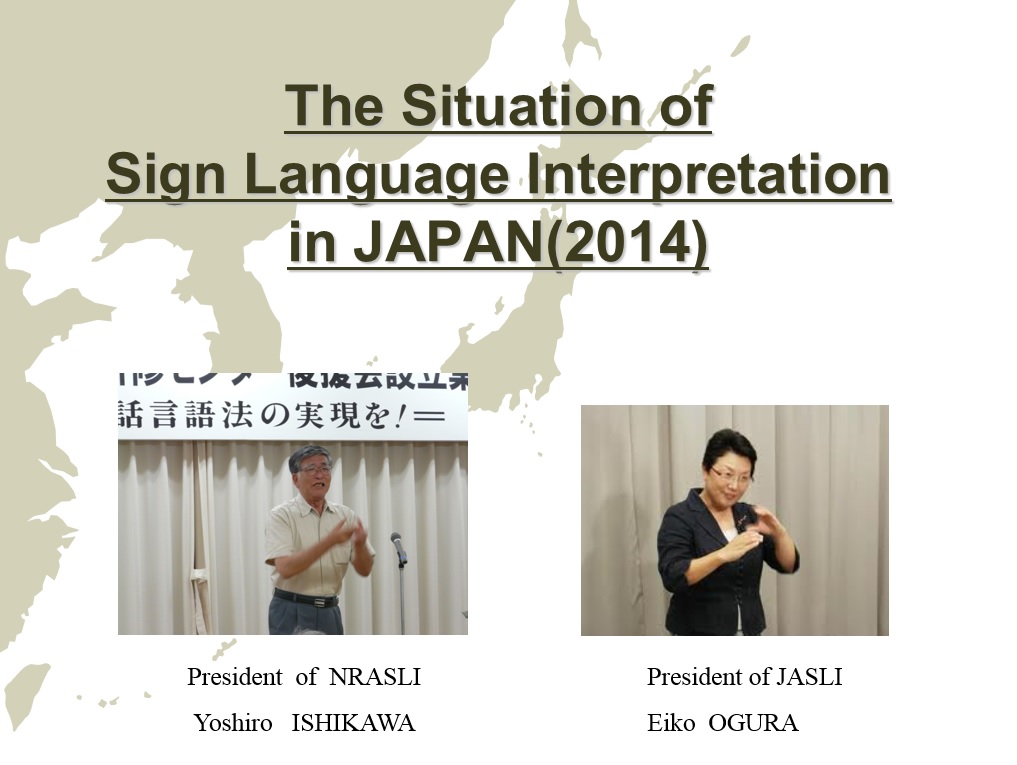
PDF file Download(737KB)
PPT file Download(2.5MB)
8. A Study Guide on the Code of Ethics for Certified Sign Language Interpreters(2019)
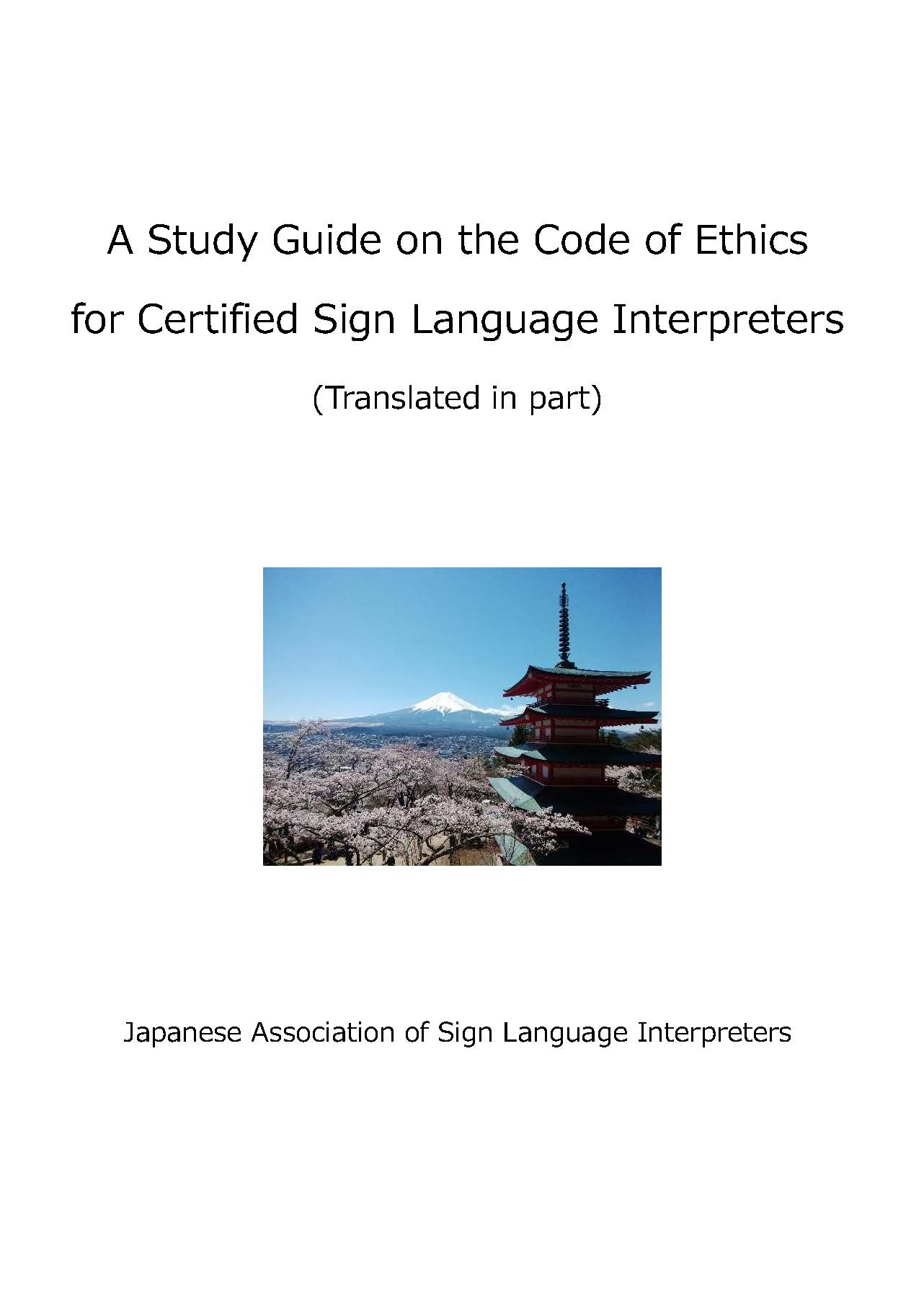
PDF file Download(2MB)

